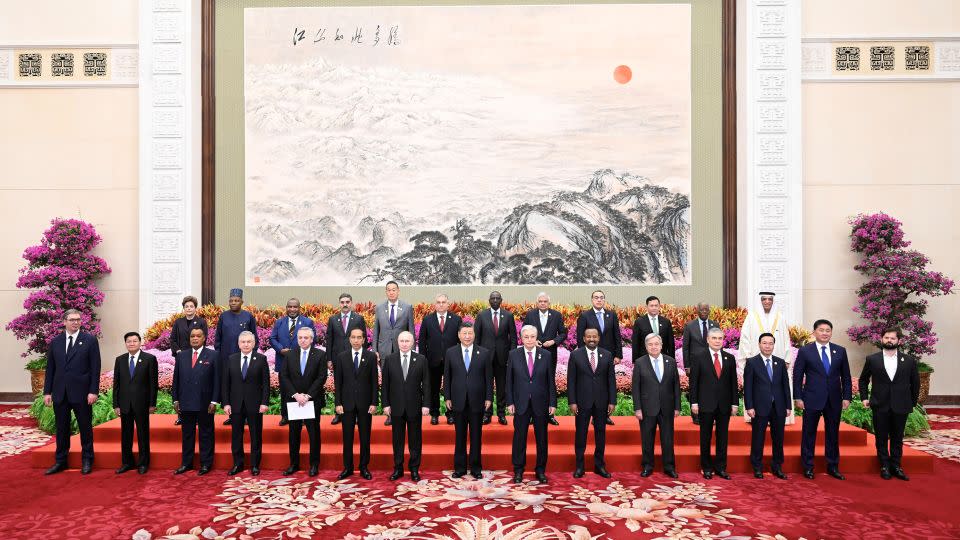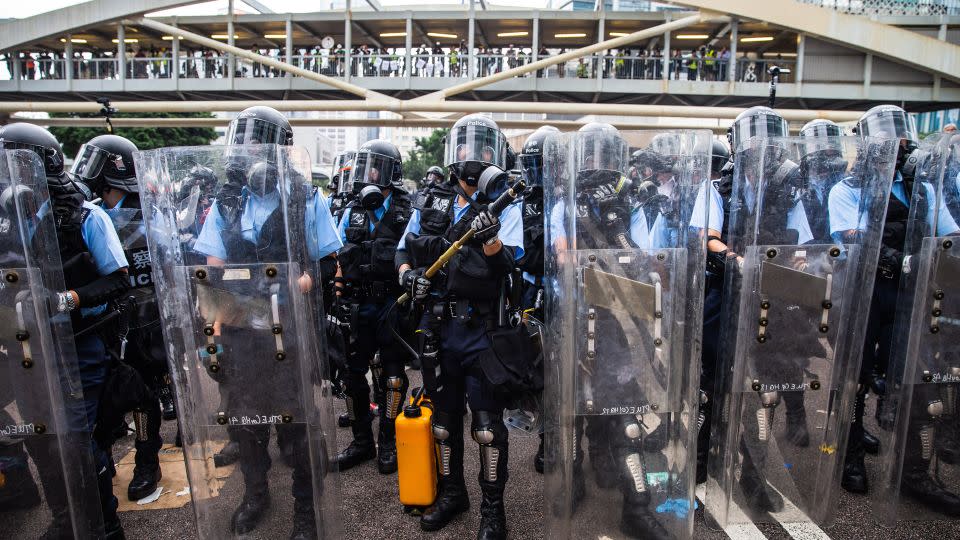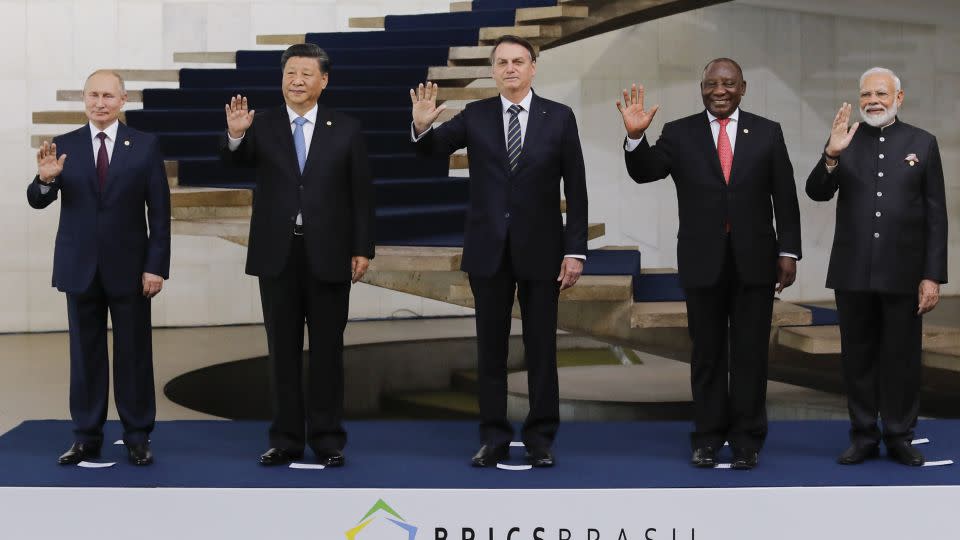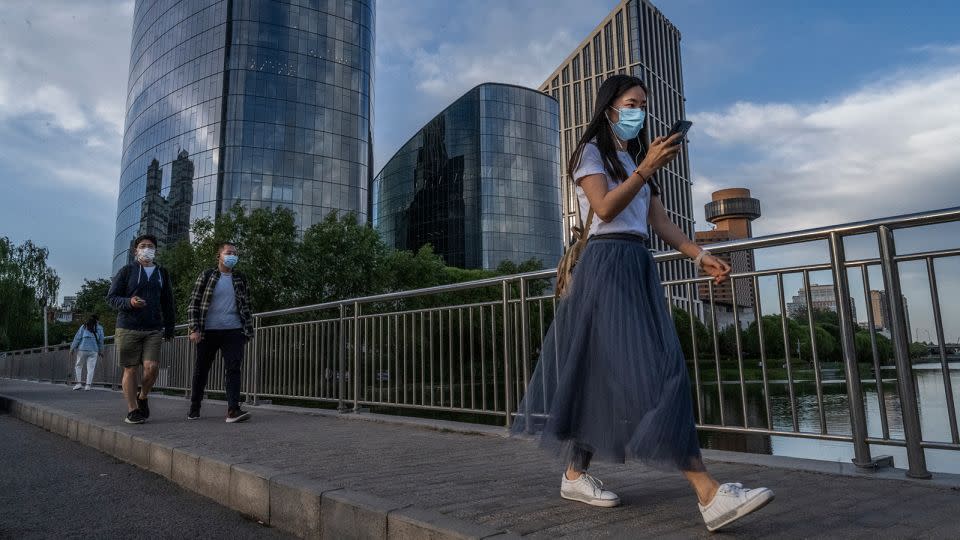Isis Almeida, Jennifer Jacobs and Jenny Leonard
Fri, November 10, 2023

(Bloomberg) -- China is bringing back soybean diplomacy as the world’s second-largest economy seeks closer ties with the US ahead of a meeting between President Xi Jinping and his American counterpart Joe Biden.
The Asian nation, the world’s top soybean importer, bought more than 3 million metric tons of the commodity from the US just this week, a volume that surprised the market. The move is a gesture of goodwill ahead of Biden-Xi talks scheduled to take place in San Francisco next week, according to people familiar with the matter who asked not to be named discussing governmental decisions.
This isn’t the first time China used the soybean for geopolitical leverage. Beijing bought and halted purchases of US supplies of the oilseed — used to make animal feed and cooking oil — several times throughout Donald Trump’s trade war. But recently, China has been scooping up cheaper Brazilian supplies instead.
As China seeks closer ties with the US — with various meetings between the two nations taking place recently — soybeans are again taking center stage. Just last month Chinese grain buyers including Cofco International Ltd. and Sinograin signed 11 agreements with crop traders such as Archer-Daniels-Midland Co., Bunge Ltd. and Cargill Inc. during a forum in Iowa, the first such deal since since the Trump-era trade dispute.
“There has certainly been a lot of ‘shuttle diplomacy’ over the past six months or so between the two countries,” said Stephen Nicholson, a global strategist for grains and oilseeds at Rabobank, one of the top lenders to the agriculture industry. “And of course, Biden is going to meet with Xi next week.”
Spokespeople for the Chinese embassy in Washington didn’t immediately comment. The White House declined to comment.
The latest purchases, which surprised the market this week, were led by state-owned Sinograin and will help bolster Chinese inventories. They also come the same week as Treasury Secretary Janet Yellen hosted People’s Republic of China Vice Premier He Lifeng and ahead of the Nov. 15 Biden-Xi meeting on the sidelines of next week’s Asia-Pacific Economic Cooperation forum.
China bought American soybeans even though they are more expensive than Brazilian supplies, and processing margins are weak. The nation is purchasing more than it needs for domestic use, signaling it’s seeking to build stockpiles, said Alex Sanfeliu, head of world trading at Cargill, the world’s largest agricultural commodities trader.
“Xi’s visit is the only logical explanation why Sinograin would pay a big premium over Brazil beans,” said Ken Morrison, an independent commodity trader in St. Louis. “Sinograin has a dual role; they crush beans and they manage reserve stocks for the government. Crushing is very competitive in China as it is everywhere. Crushers don’t pay above-market prices.”
Purchase Politics
While there is “a little politics” to the purchases, US soybeans are also better to store than supplies from Brazil, said Dan Basse, president of Chicago-based consultants AgResource Co. That’s because Brazilian soybeans usually contain too much moisture and have a higher soyoil content, he said.
There are also some concern about the weather in Brazil, and long lines at the country’s ports. Falling prices in the US may also have lured buyers, said Chris Robinson, managing director of agriculture and commodities at TJM Institutional Services in Chicago.
“It certainly looks like the Chinese saw that six-month low as an opportunity,” he said.
China is seeking also closer ties with the Biden administration ahead of the 2024 presidential elections, two of the people said. There’s some anxiety in the country about the possibility of Trump returning to power when the Chinese economy isn’t as robust as it was during the trade war, the people said.
“The Chinese are pragmatic and they know in the long run, the US is too valuable of trading partner to leave behind,” Rabobank’s Nicholson said.
--With assistance from Michael Hirtzer, Tarso Veloso and Gerson Freitas Jr..
China just bought 3 million metric tons of American soybeans
Phil Rosen
Fri, November 10, 2023

China purchased more than 3 million metric tons of US soy this week, reports said.
The move nods to a bigger appetite than expected for the commodity as top-producer Brazil faces headwinds.
Reuters reported that Tuesday saw China make the biggest one-day purchase of US soybeans in months.
China this week purchased more than 3 million metric tons of American soy, good for the biggest single-day purchase in at least three months.
Reuters reported on Tuesday that traders said Chinese importers secured roughly 10 cargoes of soybeans, or about 600,000 metric tons, for shipments coming from the Gulf Coast and Pacific Northwest to be delivered between December and March.
Bloomberg on Friday reported that China had nailed down orders of 3 million metric tons on Tuesday and Wednesday. The volume suggests a larger than expected appetite for the grain.
"China is stocking up, buying more quantities than everyone thought," the head of trading at Cargill, the world's largest crop trader, told Bloomberg.
The big purchase of the key agricultural commodity from the US comes as Brazil, the world's biggest soy supplier, faces production obstacles from a bout of unfavorable weather that could potentially diminish crop yields.
US producers have also faced headwinds of their own amid shipping disruptions and competition with Brazil, which despite recent weather concerns ,ultimately harvested a record soy crop this year.
Per Reuters, the US Department of Agriculture forecasts a 12% year-over-year decline for US sales to China of the commodity. October sales to China were 35% lower compared to the same month last year.
Xi Jinping’s ‘Old Friends’ from Iowa Get a Dinner Invitation
Jennifer Jacobs
Sat, November 11, 2023 a

(Bloomberg) -- A group of Chinese President Xi Jinping’s “old friends” from Iowa have been invited to a dinner he will attend in California next week — 38 years after they welcomed the then-unknown party official for a hog roast, farm tours and a Mississippi River boat ride as they showed him how capitalists do agriculture.
“This has been a heck of a journey — we can’t figure it out. We don’t even know why he likes us!” said Sarah Lande, an 85-year-old Muscatine resident who has maintained connections with Xi since he made his first visit to the US as the leader of a food processing delegation from China’s Hebei Province in 1985.
“But we’re eager to meet with him, too. We’re regular, everyday people,” Lande added.
Xi’s warm and enduring bond with the Midwesterners he first encountered nearly four decades ago stands in contrast with the suspicions and acrimony that have characterized relations between the two largest economies over the last few years.
Both Xi and President Joe Biden, who plan to meet Wednesday during the Asia-Pacific Economic Cooperation summit in San Francisco, have taken recent diplomatic steps to ease the strains.
The Iowans’ invitations for the reception and dinner, on the sidelines of APEC, came through the the National Committee on US-China Relations and the US-China Business Council, in coordination with China’s embassy, Lande said.
The Iowans haven’t been told if they’ll get a private audience with Xi, who was 31 when they met him.
Terry Branstad, a former Iowa governor and US ambassador to China, has also been invited, according to an aide.
Earlier: China’s Soy Diplomacy Makes a Comeback Ahead of Biden-Xi Meeting
In 1985, Gary Dvorchak’s parents gave Xi his bedroom, decorated with Star Trek items, in their Muscatine home. Dvorchak and his sister Paula, who talked to the future Chinese leader about American movies, are on next week’s guest list.
So is Luca Berrone, then an Iowa economic development official, who drove Xi around to company sites including Monsanto Co., Cargill Inc. and Quaker Oats, grain and livestock farms, the Amana Colonies — a religious community known for its farming heritage and communal living — and Iowa State University in Ames.
“He wanted to learn how to feed his people,” Lande said in a telephone interview. Xi had read Mark Twain “and he really wanted to see the Mississippi,” she said. She hosted him for a potluck at her home overlooking the river.
Berrone’s stops with the four-member delegation and their interpreter included a farm in Coggon, a spot where Twain had hidden manuscripts in a wall. Berrone arranged hotels as well as home stays where none were available.
“We had a really good time in two weeks,” he said. “We were like the road movie — five or six guys on a road trip.”
‘You Are America’
The Iowans made an impression on Xi, said Ken Quinn, the former president of the World Food Prize Foundation, who is planning to attend the Bay Area dinner.
“He was not anyone special and the friendship they showed him touched him personally,” said Quinn, who met Xi’s father, Xi Zhongxun, an architect of China’s economic opening, when he himself traveled to Iowa in 1980.
When Xi Jinping returned to the United States in 2012, as vice president and about to ascend to the presidency, he gathered with the “old friends” in Lande’s Muscatine home again. “He said, ‘You were the first people I met in America, and to me, you are America,’” she said.
That year, Xi invited more than a dozen of the Iowans to China, and “they had the whole thing set up in two months,” Lande said. “He was the top-down boss and he made it happen.”
Xi and his wife, Peng Liyuan — a famous Chinese folk singer in her own right — threw a banquet for them. “She said, ‘Well, I just had to meet the people from Iowa,’” Lande recalled. “By the way, she is a lovely, beautiful lady. Her last remark was, ‘If we ever retire, I’m going to gather my daughter and we’re coming to Muscatine.’”
China’s embassy in Washington and the dinner’s organizers didn’t respond to requests for comment on Friday night.
The reunion aside, Iowa, a major soybeans and corn producer, has an interest in better relations between Washington and Beijing.
This week, China, a top soybean importer, bought more than 3 million metric tons of the commodity from the US, a volume that surprised the market. China had been buying cheaper Brazilian supplies and the move is a goodwill gesture ahead of the Biden-Xi talks, according to people familiar with the matter who asked not to be named discussing governmental decisions.
Jennifer Jacobs
Sat, November 11, 2023 a

(Bloomberg) -- A group of Chinese President Xi Jinping’s “old friends” from Iowa have been invited to a dinner he will attend in California next week — 38 years after they welcomed the then-unknown party official for a hog roast, farm tours and a Mississippi River boat ride as they showed him how capitalists do agriculture.
“This has been a heck of a journey — we can’t figure it out. We don’t even know why he likes us!” said Sarah Lande, an 85-year-old Muscatine resident who has maintained connections with Xi since he made his first visit to the US as the leader of a food processing delegation from China’s Hebei Province in 1985.
“But we’re eager to meet with him, too. We’re regular, everyday people,” Lande added.
Xi’s warm and enduring bond with the Midwesterners he first encountered nearly four decades ago stands in contrast with the suspicions and acrimony that have characterized relations between the two largest economies over the last few years.
Both Xi and President Joe Biden, who plan to meet Wednesday during the Asia-Pacific Economic Cooperation summit in San Francisco, have taken recent diplomatic steps to ease the strains.
The Iowans’ invitations for the reception and dinner, on the sidelines of APEC, came through the the National Committee on US-China Relations and the US-China Business Council, in coordination with China’s embassy, Lande said.
The Iowans haven’t been told if they’ll get a private audience with Xi, who was 31 when they met him.
Terry Branstad, a former Iowa governor and US ambassador to China, has also been invited, according to an aide.
Earlier: China’s Soy Diplomacy Makes a Comeback Ahead of Biden-Xi Meeting
In 1985, Gary Dvorchak’s parents gave Xi his bedroom, decorated with Star Trek items, in their Muscatine home. Dvorchak and his sister Paula, who talked to the future Chinese leader about American movies, are on next week’s guest list.
So is Luca Berrone, then an Iowa economic development official, who drove Xi around to company sites including Monsanto Co., Cargill Inc. and Quaker Oats, grain and livestock farms, the Amana Colonies — a religious community known for its farming heritage and communal living — and Iowa State University in Ames.
“He wanted to learn how to feed his people,” Lande said in a telephone interview. Xi had read Mark Twain “and he really wanted to see the Mississippi,” she said. She hosted him for a potluck at her home overlooking the river.
Berrone’s stops with the four-member delegation and their interpreter included a farm in Coggon, a spot where Twain had hidden manuscripts in a wall. Berrone arranged hotels as well as home stays where none were available.
“We had a really good time in two weeks,” he said. “We were like the road movie — five or six guys on a road trip.”
‘You Are America’
The Iowans made an impression on Xi, said Ken Quinn, the former president of the World Food Prize Foundation, who is planning to attend the Bay Area dinner.
“He was not anyone special and the friendship they showed him touched him personally,” said Quinn, who met Xi’s father, Xi Zhongxun, an architect of China’s economic opening, when he himself traveled to Iowa in 1980.
When Xi Jinping returned to the United States in 2012, as vice president and about to ascend to the presidency, he gathered with the “old friends” in Lande’s Muscatine home again. “He said, ‘You were the first people I met in America, and to me, you are America,’” she said.
That year, Xi invited more than a dozen of the Iowans to China, and “they had the whole thing set up in two months,” Lande said. “He was the top-down boss and he made it happen.”
Xi and his wife, Peng Liyuan — a famous Chinese folk singer in her own right — threw a banquet for them. “She said, ‘Well, I just had to meet the people from Iowa,’” Lande recalled. “By the way, she is a lovely, beautiful lady. Her last remark was, ‘If we ever retire, I’m going to gather my daughter and we’re coming to Muscatine.’”
China’s embassy in Washington and the dinner’s organizers didn’t respond to requests for comment on Friday night.
The reunion aside, Iowa, a major soybeans and corn producer, has an interest in better relations between Washington and Beijing.
This week, China, a top soybean importer, bought more than 3 million metric tons of the commodity from the US, a volume that surprised the market. China had been buying cheaper Brazilian supplies and the move is a goodwill gesture ahead of the Biden-Xi talks, according to people familiar with the matter who asked not to be named discussing governmental decisions.
Biden and Xi will meet in bid to ‘stabilise’ China-US relationship
Andrew Feinberg
Fri, November 10, 2023
President Joe Biden and Chinese leader Xi Jinping will meet for the first time in a year next week, capping months of diplomacy by top US officials to ease tensions between the world’s two largest economies and manage what Mr Biden has described as “strategic competition” between Washington and Beijing.
According to White House officials who briefed reporters on plans for the bilateral meeting, the two leaders will have their first sit-down since last year’s G20 summit during next week’s Asia Pacific Economic Cooperation leaders’ meeting in San Francisco.
One senior administration official said the meeting would take place next Wednesday (15 November) in an unspecified location in the San Francisco Bay Area, but declined to offer further details, citing security considerations.
The official described the US position going into the leaders’ confab as one of relative strength, with the US economy booming thanks to “game-changing investments in American strength at home” delivered in bills signed by Mr Biden last year, including the CHIPS and Science Act, the Inflation Reduction Act, and the bipartisan infrastructure law the president continues to tout as he pursues re-election.
“The United States has had the strongest recovery and lowest inflation of any leading economy. We've created 14 million jobs more in two years than any president in a four year term, we've had 21 straight months of unemployment under 4 percent for the first time in half a century and the US economy grew by 4.9 per cent in the third quarter,” the official said.
“Large scale investments in semiconductors and clean energy production are up 20 fold since 2019, we're estimating 3.5 trillion in public and private investment over the next six decades, construction spending on manufacturing has doubled”.
The official also pointed out that the US has spent the last year “having deepened our alliances and partnerships abroad in ways that would have been unimaginable just a few years ago” as Mr Biden has executed a long-touted refocusing of US foreign policy on shoring up alliances in the Indo-Pacific region.
Since he last met with Mr Xi in Indonesia last year, Mr Biden has hosted heads of state or government from Japan, the Republic of Korea, the Philippines, India and Australia for meetings at the White House, as well as a historic trilateral summit with South Korean President Yoon Suk Yeol and Japanese Prime Minister Fumio Kashida at Camp David in August.
Mr Biden has also overseen the launch of expanded partnerships with Indo-Pacific allies, including the joint Australian-British-American agreement to enable the Royal Australian Navy to acquire and operate nuclear-powered, conventionally-armed submarines based on US and British technology.
The official also noted that Secretary of State Antony Blinken, Secretary of Defence Lloyd Austin, UN Ambassador Linda Thomas-Greenfield, US climate envoy John Kerry and the current Chairman of the Joint Chiefs of Staff have each visited the Indo-Pacific during the last week, and pointed out that Mr Biden will also meet with Indonesian President Joko Widodo on Monday before he leaves for San Francisco.
“After investing at home in strengthening ties with allies and partners abroad, now is precisely the time for high-level diplomacy,” said the official, who stressed that the “steady and consistent” approach the Biden Administration is taking towards China does not mean America is “stepping back from our interests and values” in favour of smoother relations with Beijing.
Indeed, the official noted that the Biden Administration has implemented new export controls on semiconductors and related manufacturing technology, as well as restrictions on Chinese investment in the US.
“We've taken actions against PRC entities involved in human rights abuses or slaver nonproliferation and supporting Russia's war in Ukraine, and we've continued to uphold freedom of navigation in the region by flying sailing and operating wherever international law allows,” the official said, adding the caveat that Mr Biden and his advisers are “clear-eyed” in their belief that “intense competition requires and demands intense diplomacy to manage tensions and to prevent competition from verging into conflict or confrontation”.
That “intense diplomacy” has involved months of high-level work by Mr Biden’s top aides, many of whom have made the trek to Beijing in efforts to restart bilateral communications after diplomatic and military tensions were inflamed by the US discovery and shootdown of an errand Chinese-owned spy balloon off the American east coast in February.
The last eight months have seen three separate meetings between Mr Biden’s national security adviser, Jake Sullivan, and his Chinese counterpart, as well as visits to Beijing by Mr Blinken, Treasury Secretary Janet Yellen and Commerce Secretary Gina Raimondo.
In turn, China’s vice president, foreign minister, vice-premier and other top PRC officials have trekked to Washington for reciprocal sit-downs, as the US and China have launched what a senior US official described as “working-level consultations ... in discreet, carefully-chosen areas” such as “arms control, maritime issues, and macro economic and debt issues”.
The planned meeting between Mr Biden and Mr Xi, who have known each other for roughly 12 years — since both men served as their respective countries’ vice presidents — will be the seventh interaction between the two leaders since Mr Biden took office in January 2021.
A senior White House official said the leaders are expected to “discuss strategic direction of the bilateral relationship the importance of maintaining open lines of communication,” including restarting the direct military-to-military communications channels that have been cut off since the spy balloon incident.
“We expect they'll cover a range of regional and global issues ... such as Russia's invasion of Ukraine and the Israel-Hamas conflict. And they'll consider how we can work together where our interests align, particularly on transnational challenges that affect the international community such as climate and counter-narcotics,” they said.
In response to a query from The Independent, one of the officials who briefed reporters on Thursday said Mr Biden is also expected to offer a warning to Mr Xi against undertaking any influence operations or other efforts to interfere in the upcoming 2024 presidential election.
While White House officials took pains to stress that Mr Biden would surely raise “issues where we have differences” with Beijing — including human rights, the South China Sea, and relations with Taiwan, they also stressed that the dialog Mr Biden and Mr Xi will undertake is necessary, despite the failure of US efforts to encourage China to make changes in their political and economic system.
“We know efforts to shape or reform China, over several decades have failed, but we expect China to be around and to be a major player on the world stage for the rest of our lifetimes,” the official said. “We think diplomacy is how we clear up misperceptions signal, communicate, avoid surprises and explain our competitive steps. It is also how we work together where and when our interests align ... and deliver on key priorities for the American people”.
Biden's meeting with Xi: Details emerge of what leaders will discuss in San Francisco
Ukrainska Pravda
Fri, November 10, 2023

US President Joe Biden and Chinese leader Xi Jinping will discuss restoring communication channels between the armed forces of their countries in San Francisco on 15 November.
Source: European Pravda, citing Financial Times
Details: The two sides are seeking to resume efforts to stabilise relations amid growing tensions over issues such as China's military activity near Taiwan and US efforts to prevent China from gaining access to the latest US technology.
US officials say the leaders will discuss a range of issues, including the prospect of restoring military communication channels that China closed last year after then-House of Representatives Speaker Nancy Pelosi's visit to Taiwan.
"The president has been determined to take the necessary steps to restore what we believe are central communications between the US and China on the military side," one of the US officials stated.
Biden will express concern to Xi about China's "dangerous" and "provocative" military activity around Taiwan, he said.
Officials emphasised that the summit does not mean a change in US policy towards China but is a recognition that the states need effective communication channels.
Background:
Media reports suggested that Biden and Xi Jinping plan to hold bilateral talks in San Francisco on 15 November, when Asia-Pacific leaders will gather for their annual economic meeting.
On 27 October, Biden met with Wang Yi, China's Foreign Minister and Head of the Foreign Affairs Commission Office of the Chinese Communist Party Central Committee. Before that, China's top diplomat also met with US State Secretary Antony Blinken and National Security Adviser Jake Sullivan.
These meetings were the latest in a series of high-level contacts between the US and China in an attempt to stabilise the fragile relationship between the two countries, which has been strained by the Taiwan dispute, China's aggressive actions at sea, the incident with the Chinese balloon shot down over US territory, and concerns about Chinese role in Russia's war against Ukraine.
Biden, Xi meeting set for next week in California
Morgan Chalfant
Fri, November 10, 2023

The News
U.S. President Joe Biden will meet with Chinese leader Xi Jinping in California next week, senior Biden administration officials confirmed, and will urge China to restore military-to-military communications with the U.S. and discourage interference in Taiwan’s upcoming elections.
The meeting on the sidelines of the Asia-Pacific Economic Cooperation summit on Wednesday will be the first engagement between Biden and Xi since their talks in Bali about a year ago. It will cover a large range of issues, including matters of disagreement, like human rights, and areas where the U.S. hopes to work with China, like climate change.
One senior administration official told reporters the U.S. had communicated to the Chinese that “basically every element” of the bilateral relationship will be on the table for discussion, acknowledging that fentanyl and artificial intelligence may be among the topics discussed.
The Biden administration’s overarching goal going into the meeting is to stabilize relations between the U.S. and China at a time of high tensions on a range of issues, and administration officials are setting low expectations for any outcomes.
“We’re not talking about a long list of outcomes or deliverables,” a second senior administration official said. “The goals here really are about managing the competition, preventing the downside risk of conflict and ensuring channels of communication are open.”
The Chinese Foreign Ministry also confirmed Friday that Xi would travel to San Francisco to attend APEC at Biden’s invitation.
Know More
While the meeting next week looks unlikely to result in major announcements, one area where there could be progress is the resumption of military-to-military communications, which China severed in protest of then-House Speaker Nancy Pelosi’s visit to Taiwan last year. Axios reported this week that Biden and Xi planned to announce the resumption of military-to-military communications.
Biden and Xi will meet as the world grapples with two wars, and Biden administration officials said the U.S. president would raise both Russia’s war in Ukraine and the Israel-Gaza war. Biden will ask China to use its influence with Iran to communicate to Tehran that it should not escalate the conflict in the Middle East, the first senior administration official said.
With the Taiwan elections approaching in January of next year, officials said they would make clear to the Chinese that the U.S. does not support Taiwan’s independence and that China should not meddle in Taiwan’s elections.
Step Back
Relations between the U.S. and China are at a low point, exacerbated by the Chinese spy balloon that traversed the U.S. at the beginning of the year and was shot down by the U.S. military. The incident forced Secretary of State Antony Blinken to delay a planned trip to China.
The U.S. has been stepping up engagement with China in the months since, sending multiple Cabinet officials to Beijing to meet with Chinese officials in hopes of opening up more lines of communication between the two countries.
Notable
The Biden administration hopes to reach an agreement with China to curb the flow of fentanyl into the U.S., according to NBC News.
The top Democrat on the House select committee on China told Semafor that Biden should press Xi on human rights and economic issues, while working to restore the Fulbright student exchange program and increase commercial flights between both countries.
Xi, Biden to meet in US next week for first talks in a year
Danny KEMP
Fri, November 10, 2023

US President Joe Biden and China's President Xi Jinping last met in Bali in November 2022 (SAUL LOEB)
US President Joe Biden and Chinese President Xi Jinping will hold their first meeting in nearly a year next week on the sidelines of the APEC summit in San Francisco, officials from the rival superpowers said Friday.
The meeting will be held Wednesday and the two leaders will discuss a range of bilateral, regional and global issues as well as ways to "responsibly manage competition," White House Press Secretary Karine Jean-Pierre said in a statement.
The Chinese Foreign Ministry said Xi will travel to San Francisco from November 14-17 for the "China-US heads of state meeting," while also confirming for the first time that he plans to attend the Asia-Pacific Economic Cooperation (APEC) leaders' gathering.
The Xi-Biden summit follows a series of meetings in recent months between high-level officials in Beijing, Washington and elsewhere, but will be the leaders' first encounter since November 2022 in Bali.
Wednesday's meeting will aim to "stabilize" relations that have since plunged into deep freeze, a senior US official said, cautioning not to expect major outcomes.
Biden and Xi will also discuss pressing global crises such as the Israel-Hamas war and Russia's invasion of Ukraine, as well as tensions over the flashpoint island of Taiwan, the official said, speaking on condition of anonymity.
While Biden, 80, and Xi, 70, are both attending the APEC summit in San Francisco, officials would not say whether their meeting would happen in the city itself.
"Our goal will be to try to take steps that indeed stabilize the relationship between the United States and China, remove some areas of misunderstanding and open up new lines of communication," added the official.
"We are in competition with China, but we do not seek conflict, confrontation or a new Cold War. We're for managing the competition responsibly."
- 'Nothing held back' -
Washington and an increasingly assertive China have been at odds in recent years with both countries vying for global influence, particularly in the Asia-Pacific region.
Biden and Xi made encouraging noises after the Bali talks but tensions have repeatedly flared since, with the United States protesting earlier this year what it described as a Chinese surveillance balloon over US soil.
China in turn has been outraged by growing US pressure including restrictions on high-tech chips, which Washington fears Beijing will put to military use.
Tensions are particularly high over Taiwan, the self-ruled democracy that Beijing claims and has not ruled out taking by force.
Biden was expected to warn Xi against any attempt to meddle in Taiwan's elections next year and to urge against further military exercises of the kind China staged near Taiwan last year after a visit by members of the US Congress.
"Interference in the Taiwan election is something we're extremely concerned about. And of course, we'll plan on delivering that message again," a second US official said.
US officials said the Biden-Xi talks would be "very broad" and that they were "not talking about a long list of outcomes or deliverables" at the end.
"Nothing will be held back, everything will be on the table," the first US official said.
But Biden and Xi were expected to discuss the "absolutely crucial" issue of restoring a US-China military hotline to prevent any escalations between the two countries.
"We expect they'll cover a range of regional and global issues too, such as Russia's invasion of Ukraine and the Israel-Hamas conflict," the second US official said.
dk/caw/des/pbt



















